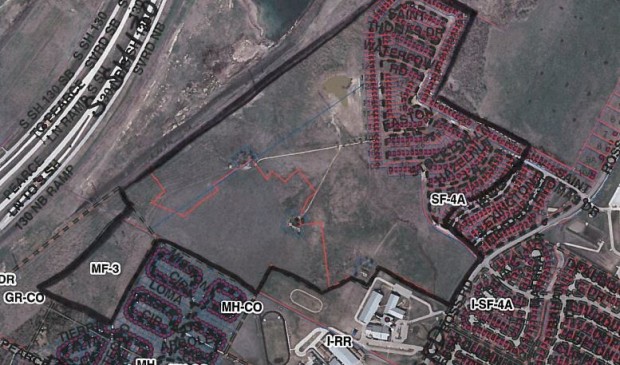Mobile home development stokes hope and fear
Thursday, October 22, 2015 by
Jack Craver The Zoning and Platting Commission narrowly approved a recommendation Tuesday for an 855-home expansion of the Oak Ranch mobile home park on the east side after three hours of contentious testimony from neighbors on both sides of the issue.
The commission voted to recommend rezoning the property from small lot single-family (SF-4A) and medium density multifamily (MF-3) homes to mobile home residency (MH).
But in the wake of concerns raised by neighbors and tenant advocates over exploitative business practices in mobile home communities, the commission stipulated in its recommendation that the developer work to develop a “regime” to present to City Council that will specify the rights of residents of mobile home communities. The recommendation also called for improvements to be made to nearby Pearce Lane before the new development is complete.
The debate centered on the business practices of Scott Roberts, CEO of Roberts Communities, a Phoenix-based business that runs mobile home communities in a number of cities. After constructing Oak Ranch four years ago, the company acquired two adjacent parks on the northeast side, Hidden Valley and High Meadows, in April.
A number of Oak Ranch residents came to the hearing to offer a ringing endorsement of their new community, urging the commission to expand it.
“I’m very excited and encouraged by Scott’s vision for this expansion,” said Virginia Melgar. “I feel like it allows people to own a home who may not otherwise have that opportunity.”
Karla Saldana was equally effusive: “You’re really making dreams come true for families like mine.”
But a number of residents of Hidden Valley and High Meadows, which were both recently renamed Loma Vista, offered a very different opinion of Roberts Communities. Along with leaders of Austin Interfaith, an advocacy group for marginalized groups, they urged the commission to postpone the Oak Ranch expansion.
Many of the residents complained that since taking over, Roberts has imposed costly rules that they cannot meet. Many talked of having relatives’ cars towed in the middle of the night or being required to do expensive repairs to their houses.
“He’s not a good steward of the property he owns now,” said Sammy Hall, who has lived in the community for nearly two decades.
Interfaith leaders said the stories were indicative of a national trend in which investors squeeze money out of low-income mobile home residents with fee increases and rent hikes. Mobile home residents often own their home but not the property on which it’s located, meaning they often endure steep rent hikes because they cannot afford to pay the several thousand dollars to move their home. In the case of Loma Vista, the management is trying to “turn around” the property by driving out the poor, said Kurt Cadena-Mitchell, an Interfaith leader.
“What that looks like on the ground is lower-income residents, immigrants – those folks will be pushed out in the turnaround process,” he told the Austin Monitor.
Concerns over abuses by mobile home investors are also likely higher as a result of an incident in May in which City Council Member Greg Casar helped residents of the North Lamar Community Mobile Home Park sue park owners over rent and utility increases that they alleged violated their leases.
Nikelle Meade, an attorney for Roberts, said that complaints from Loma Vista residents were unrelated to the Oak Ranch project. The rules at issue, she said, had been in place prior to Roberts’ takeover, but may not have been enforced.
“To operate it at our standards, Roberts opted to enforce these rules that have existed for a long time,” Meade said. “I don’t fault those people for being afraid of change. … I think when they really step back and look at them, the rules are really in everybody’s best interests.”
The development barely earned the commission’s recommendation. Due to three absences and a recent resignation, only seven members of the commission were present, meaning that every motion needed the vote of all but one of those present to pass.
Commissioner Thomas Weber said he opposed because he believed the current zoning was superior, while Vice Chair Jackie Goodman was initially in favor of postponement. But after Meade said that postponing until the commission’s next meeting would force Roberts to pay to extend the option agreement he currently has with the current landowner, Goodman agreed to vote for the recommendation if it included the regime provision and the call for improvements to Pearce Lane.
Goodman said that she hoped whatever regime was developed could become a template to be included in future mobile home leases.
Cadena-Mitchell said he was pleased with the result, citing the regime.
“We are very pleased with the outcome because it was very clear that the vote that passed included the intent that the commission wanted to ensure tenant protections,” he said. “It’s really setting a great model for how future properties like this can set themselves up to be good neighbors and good landlords in the city.”
Image courtesy of the City of Austin.
You're a community leader
And we’re honored you look to us for serious, in-depth news. You know a strong community needs local and dedicated watchdog reporting. We’re here for you and that won’t change. Now will you take the powerful next step and support our nonprofit news organization?



